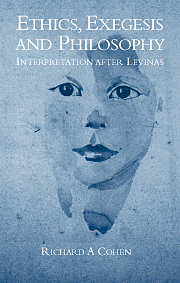Book contents
- Frontmatter
- Contents
- Introduction: philosophy as ethical exegesis
- PART I EXCEEDING PHENOMENOLOGY
- PART II GOOD AND EVIL
- 5 Alterity and alteration: development of an opus
- 6 Maternal body/maternal psyche: contra psychoanalytic philosophy
- 7 Humanism and the rights of exegesis
- 8 What good is the Holocaust? On suffering and evil
- 9 Ricoeur and the lure of self-esteem
- 10 In-conclusion
- Index
6 - Maternal body/maternal psyche: contra psychoanalytic philosophy
Published online by Cambridge University Press: 22 September 2009
- Frontmatter
- Contents
- Introduction: philosophy as ethical exegesis
- PART I EXCEEDING PHENOMENOLOGY
- PART II GOOD AND EVIL
- 5 Alterity and alteration: development of an opus
- 6 Maternal body/maternal psyche: contra psychoanalytic philosophy
- 7 Humanism and the rights of exegesis
- 8 What good is the Holocaust? On suffering and evil
- 9 Ricoeur and the lure of self-esteem
- 10 In-conclusion
- Index
Summary
For rabbinic Jews, the human being was defined as a body – animated, to be sure, by a soul – while for Hellenistic Jews (such as Philo) and (at least many Greek-speaking) Christians (such as Paul), the essence of a human being is a soul housed in a body.
Daniel Boyarin, Carnal IsraelThe psyche is the other in the same without alienating the same.
Emmanuel Levinas, Otherwise than Being or Beyond EssenceIn truth, both religion and ethics have the same intent. They both strive to elevate one from the limiting filth of self-love and to bring one to the pinnacle of loving others.
Rabbi Yehuda Ashlag, Kabbalah: A Gift of the Bible.The first part of this book, “Exceeding Phenomenology”, comprising chapters one through four, aimed to show certain defining points of convergence and divergence between Levinas's ethical metaphysics and the epistemological and ontological philosophies of Bergson, Husserl, and Heidegger primarily (but also Merleau-Ponty, Sartre, Derrida, to name some others). Its second part, “Good and Evil”, which comprises the rest of the book, is less comparative and critical than expository and positive. The previous chapter, chapter 5, began this process. It briefly reviewed the most general “themes” of Levinas's philosophy and did so by at the same time revealing the complementary relationship binding Levinas's two major works, Totality and Infinity and Otherwise than Being or Beyond Essence.
- Type
- Chapter
- Information
- Ethics, Exegesis and PhilosophyInterpretation after Levinas, pp. 161 - 215Publisher: Cambridge University PressPrint publication year: 2001



